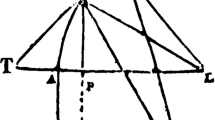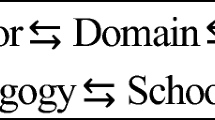Abstract
We report on a study focused on identifying how the notion of “the mathematician” is constructed in lower secondary Mexican mathematics textbooks. To conduct the study, we adopted a Foucauldian approach that allows us to identify the way in which the notion of the mathematician is constructed but also to delineate the possible effects that such construction may have on students’ subjectivities. Results show that the representations of mathematicians that most frequently appear in these textbooks are males, mainly Europeans, who lived in ancient times. The representations of female mathematicians are almost nil. We conceptualize the representations of mathematicians contained in these mathematics textbooks as part of a discourse that creates realities and constructs subjectivities, and suggest a theoretical explanation of the mechanisms that allow these representations to circulate and to be perpetuated.
Similar content being viewed by others
Notes
To determine which textbooks were bestsellers at the lower secondary level in Mexico, we turned to the Catalogue of Free Textbooks which is a report published in 2015 by the Ministry of Education of Mexico (see http://www.conaliteg.gob.mx/images/stories/libros/2015-07-21_catalogo_libros_texto_gratuitos_2015.pdf).
References
Aguilar, M. S., Rosas, A., Zavaleta, J. G. M. & Romo-Vázquez, A. (2016). Exploring high-achieving students’ images of mathematicians. International Journal of Science and Mathematics Education, 14(3), 527–548. https://doi.org/10.1007/s10763-014-9586-1.
Aiken, L. R. (1970). Attitudes toward mathematics. Review of Educational Research, 40(4), 551–596. https://doi.org/10.3102/00346543040004551.
Arriaga, A. & Benítez, M. M. (2014). Matemáticas por competencias [Mathematics by competences]. Mexico: Pearson Educación.
Arribas-Ayllon, M. & Walkerdine, V. (2008). Foucaldian discourse analysis. In C. Willig & W. Stainton-Rogers (Eds.), The SAGE handbook of qualitative research in psychology (pp. 91–108). UK: SAGE. https://doi.org/10.4135/9781848607927.n6.
Beswick, K. (2012). Teachers’ beliefs about school mathematics and mathematicians’ mathematics and their relationship to practice. Educational Studies in Mathematics, 79(1), 127–147. https://doi.org/10.1007/s10649-011-9333-2.
Brooks, K. M. (2008). A content analysis of physical science textbooks with regard to the nature of science and ethnic diversity (Doctoral dissertation). Retrieved from ProQuest Dissertations and Theses (UMI Number: 3309542).
Ceglie, R. & Olivares, V. (2012). Representation of diversity in science textbooks. In H. Hickman & B. J. Porfilio (Eds.), The new politics of the textbook. Problematizing the portrayal of marginalized groups in textbooks (pp. 49–68). Rotterdam, Netherlands: Sense Publishers. https://doi.org/10.1007/978-94-6091-912-1_4.
Chambers, D. W. (1983). Stereotypic images of the scientist: The draw-a-scientist test. Science Education, 67(2), 255–265. https://doi.org/10.1002/sce.3730670213.
Davis, P. J. & Hersh, R. (1981). The mathematical experience. Brighton, England: Harvester.
Dowling, P. (1998). The sociology of mathematics education: Mathematical myths/pedagogic texts. London, England: The Falmer Press.
Evans, J., Tsatsaroni, A. & Czarnecka, B. (2014). Mathematical images in advertising: Constructing difference and shaping identity, in global consumer culture. Educational Studies in Mathematics, 85(1), 3–27. https://doi.org/10.1007/s10649-013-9496-0.
Finson, K. D. (2002). Drawing a scientist: What we do and do not know after fifty years of drawings. School Science and Mathematics, 102(7), 335–345. https://doi.org/10.1111/j.1949-8594.2002.tb18217.x.
Foucault, M. (1972). The archeology of knowledge and the discourse on language (A. Sheridan, Trans.). New York, NY: Pantheon Books.
Foucault, M. (1977). Discipline and punish. The birth of the prison (A. M. Sheridan Smith, Trans.). New York, NY: Vintage Books.
Foucault, M. (1978). The history of sexuality. Volume I: An introduction (R. Hurley, Trans.). New York, NY: Pantheon Books.
Foucault, M. (1980a). Power/knowledge: Selected interviews and other writings 1972–1977 (C. Gordon, Ed.; C. Gordon, L. Marshall, J. Mepham, K. Soper, Trans.). New York, NY: Pantheon Books.
Foucault, M. (1980b). The history of sexuality: Interview. Oxford Literary Review, 4(2), 3–14. https://doi.org/10.3366/olr.1980.002.
Foucault, M. (1982). The subject and the power. Critical Inquiry, 8(4), 777–795.
Foucault, M. (2003). “Society must be defended”. Lectures at the Collège de France 1975–1976 (M. Bertani & A. Fontana, Eds.; D. Macey, Trans.). New York, NY: Picador.
Furinghetti, F. (1993). Images of mathematics outside the community of mathematicians: Evidence and explanations. For the Learning of Mathematics, 13(2), 33–38.
Gutiérrez, R. (2013). Why (urban) mathematics teachers need political knowledge. Journal of Urban Mathematics Education, 6(2), 7–19.
Herbel-Eisenmann, B. & Wagner, D. (2007). A framework for uncovering the way a textbook may position the mathematics learner. For the Learning of Mathematics, 27(2), 8–14.
Howson, A. G., Kahane, J.-P. & Pollak, H. (1988). The popularization of mathematics. L’Enseignement Mathématique, 34, 205–212. https://doi.org/10.5169/seals-56594.
Kollosche, D. (2016). Criticising with Foucault: Towards a guiding framework for socio-political studies in mathematics education. Educational Studies in Mathematics, 91(1), 73–86. https://doi.org/10.1007/s10649-015-9648-5.
Kollosche, D. (2017). A socio-critical analysis of students’ perceptions of mathematics. In H. Straehler-Pohl, N. Bohlmann, & A. Pais (Eds.), The disorder of mathematics education. Challenging the sociopolitical dimensions of research (pp. 173–189). Switzerland: Springer. https://doi.org/10.1007/978-3-319-34006-7_11.
Mandl, H. & Levin, J. R. (Eds.). (1989). Knowledge acquisition from text and pictures. North-Holland, Netherlands: Elsevier.
Martin, L. & Gourley-Delaney, P. (2014). Students’ images of mathematics. Instructional Science, 42(4), 595–614. https://doi.org/10.1007/s11251-013-9293-2.
McBride, M. (1989). A Foucaldian analysis of mathematical discourse. For the Learning of Mathematics, 9(1), 40–46.
Mead, M. & Métraux, R. (1957). Image of the scientist among high-school students. Science, 126(3270). 384–390. https://doi.org/10.1126/science.126.3270.384.
Medina-Jerez, W., Middleton, K. V. & Orihuela-Rabaza, W. (2011). Using the DAST-C to explore Colombian and Bolivian students’ images of scientists. International Journal of Science and Mathematics Education, 9(3), 657–690. https://doi.org/10.1007/s10763-010-9218-3.
Mendick, H. (2005). Mathematical stories: Why do more boys than girls choose to study mathematics at AS-level in England? British Journal of Sociology of Education, 26(2), 225–241. https://doi.org/10.1080/0142569042000294192.
Mendick, H. (2007). Mathematical images and identities: Education, entertainment, social justice. Full research report ESRC end of award report [RES-000-23-1454]. Swindon: ESRC. Retrieved from http://www.leeds.ac.uk/educol/documents/190670.pdf.
Ministry of Education of Mexico (2010). Geografía Sexto Grado [Geography sixth grade]. Mexico: Secretaría de Educación Pública.
Moreau, M.-P., Mendick, H. & Epstein, D. (2010). Constructions of mathematicians in popular culture and learners’ narratives: A study of mathematical and non-mathematical subjectivities. Cambridge Journal of Education, 40(1), 25–38. https://doi.org/10.1080/03057640903567013.
Mulkey, L. M. (1987). The use of a sociological perspective in the development of a science textbook evaluation instrument. Science Education, 71(4), 511–522. https://doi.org/10.1002/sce.3730710404.
Parker, I. (1994). Reflexive research and the grounding of analysis: Social psychology and the psy-complex. Journal of Community & Applied Social Psychology, 4(4), 239–252. https://doi.org/10.1002/casp.2450040404.
Piatek-Jimenez, K. (2008). Images of mathematicians: A new perspective on the shortage of women in mathematical careers. ZDM – The International Journal on Mathematics Education, 40(4), 633–646. https://doi.org/10.1007/s11858-008-0126-8.
Picker, S. H. & Berry, J. S. (2000). Investigating pupils’ images of mathematicians. Educational Studies in Mathematics, 43(1), 65–94. https://doi.org/10.1023/A:1017523230758.
Piper (2017, February 22). Hands off my confidence [Blog post] Retrieved from http://blogs.ams.org/inclusionexclusion/2017/02/22/hands-off-my-confidence/.
Ramírez, C. M., Castillo, C. R., Vergara, R. D., Flores, O. M. E. & Azpeitia, V. J. G. (2015). Matemáticas 3. Desafíos Matemáticos [Mathematics 3. Mathematical challenges]. Mexico: Fernández Educación.
Rensaa, R. J. (2006). The image of a mathematician. Philosophy of Mathematics Education Journal, 19, 1–18.
Rock, D. & Shaw, J. M. (2000). Exploring children’s thinking about mathematicians and their work. Teaching Children Mathematics, 6(9), 550–555.
Sánchez, S. F. (2013). Matemáticas 2. Construcción del pensamiento. [Mathematics 2. Thinking construction]. Mexico: Fernández Educación.
Wagner, D. (2012). Opening mathematics texts: Resisting the seduction. Educational Studies in Mathematics, 80(1), 153–169. https://doi.org/10.1007/s10649-011-9372-8.
Walshaw, M. (2001). A Foucauldian gaze on gender research: What do you do when confronted with the tunnel at the end of the light? Journal for Research in Mathematics Education, 32(5), 471–492.
Walshaw, M. (2007). Working with Foucault in education. Rotterdam, Netherlands: Sense Publishers.
Willig, C. (2013). Introducing qualitative research in psychology (3rd ed.). Maidenhead, UK: Open University Press.
Wilson, J. L. & Latterell, C. M. (2001). Nerds? Or nuts? Pop culture portrayals of mathematicians. ETC: A Review of General Semantics, 58(2), 172–178.
Acknowledgments
We want to thank the anonymous reviewers who, through the reviewing process of this paper, helped us to develop our understanding of Foucauldian discourse analysis.
Author information
Authors and Affiliations
Corresponding author
Additional information
The thing with dominant narratives is they are everywhere, infecting us all — Piper, 2017
Rights and permissions
About this article
Cite this article
Sánchez Aguilar, M., Castaneda, A. A Foucauldian Analysis of Representations of Mathematicians in Lower Secondary Mexican Mathematics Textbooks. Int J of Sci and Math Educ 18, 753–770 (2020). https://doi.org/10.1007/s10763-019-09986-z
Received:
Accepted:
Published:
Issue Date:
DOI: https://doi.org/10.1007/s10763-019-09986-z




